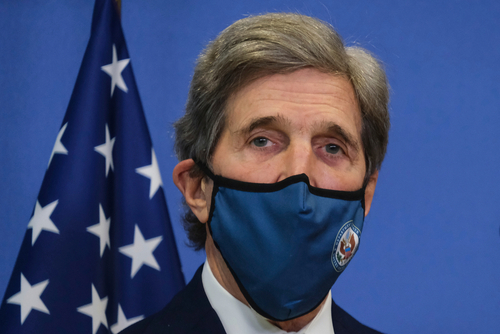
In a moment that could only be described as both unexpected and ironically fitting, a recent climate change conference in Dubai was the stage for an incident that has since overshadowed the serious discussions intended to take place. John Kerry, serving as the climate envoy for the Biden administration, found his speech on the urgent need to address global warming interrupted by a sound that humorously punctuated the topic at hand: the reduction of personal methane emissions.
The incident occurred amidst Kerry’s call for drastic measures to combat climate change, specifically the elimination of coal plants worldwide. With coal accounting for a significant portion of global electricity generation, including 20% of energy in the United States, the implications of such a proposal are far-reaching. Yet, it was the unexpected noise that captured the attention of attendees and has since reverberated across social media platforms.
Did John Kerry just fart on stage at the climate summit? pic.twitter.com/yo2IjbQU6o
— Benny Johnson (@bennyjohnson) December 5, 2023
While the occurrence may have provided a moment of levity, it also served as an unplanned call to action for individuals to consider their own contributions to greenhouse gas emissions. Methane, a potent greenhouse gas with a significant impact on climate change, can come from a variety of sources, including human activity. The interruption at the conference could be seen as a symbolic reminder of the personal responsibility each person holds in the larger context of environmental stewardship.
The broader message of Kerry’s speech, however, should not be lost in the shuffle of viral moments. The urgency of addressing climate change remains a critical issue facing the international community. As nations grapple with the transition away from fossil fuels, the debate continues over the best path forward to achieve both environmental sustainability and economic stability.
Climate con man extraordinaire, John Kerry: The farming industry must be destroyed in order to achieve Net Zero.
"Agriculture contributes about 33% of all the emissions of the world. And we can't get to Net Zero—we don't get this job done—unless agriculture is front and centre… pic.twitter.com/zTHS9D21CQ
— Wide Awake Media (@wideawake_media) December 6, 2023
Critics of the current administration’s approach to climate policy argue that the push to eliminate coal plants fails to consider the practical implications for energy reliability and economic consequences, particularly in regions heavily reliant on coal for power and employment. They advocate for a more balanced strategy that includes investment in cleaner technologies and gradual transitions to ensure communities are not left behind.
The conference in Dubai, meant to be a platform for serious dialogue and commitments to action, has instead become a talking point for a different reason. While some may view the interruption as a mere distraction, others see it as a poignant, if not humorous, symbol of the collective effort needed to reduce emissions – from the global scale down to the individual.
As the world continues to face the challenges posed by climate change, events like these serve as a reminder that the conversation is not just about policy and technology, but also about awareness and personal accountability. It is a complex issue that requires a multifaceted approach, blending innovation, regulation, and individual behavior change.
In the aftermath of the conference, discussions have continued, with many expressing support for the need to address climate change aggressively. Yet, the path forward remains contentious, with debates over the role of government intervention, the pace of transitioning to renewable energy sources, and the economic impacts on industries and workers.
The incident at the climate change conference, while perhaps a minor footnote in the grand scheme of things, has nonetheless sparked conversations about the role of personal choices in the fight against global warming. It serves as a reminder that every action, no matter how small or seemingly insignificant, contributes to the larger effort to preserve our planet for future generations.
As the world moves forward with its climate goals, it will be important to maintain a sense of humor and perspective. After all, change is often a mix of the profound and the prosaic, the global and the personal. And sometimes, it takes an unexpected interruption to remind us of the part we all play in shaping the future of our environment.














I don’t think the title of your article matches the content lol. Just kidding, mainly because I had some doubts after reading the article.
Thank you for your sharing. I am worried that I lack creative ideas. It is your article that makes me full of hope. Thank you. But, I have a question, can you help me?